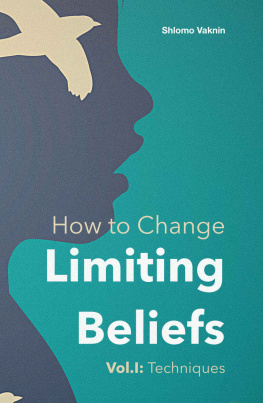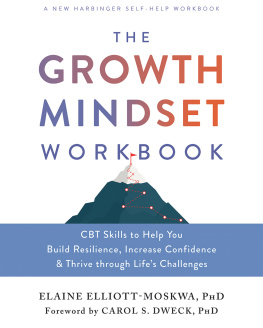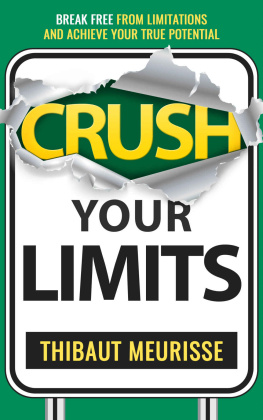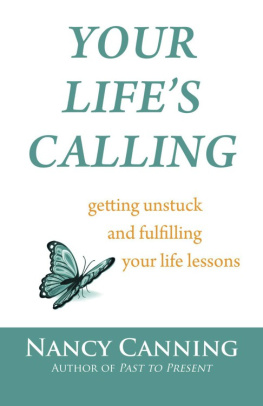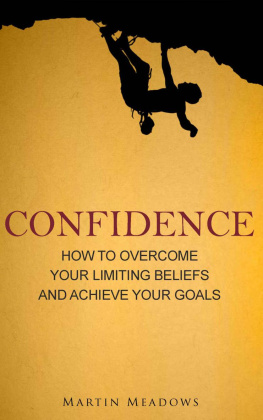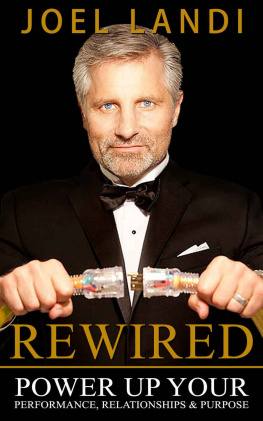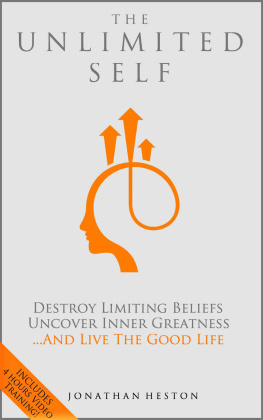Vaknin - change limiting beliefs
Here you can read online Vaknin - change limiting beliefs full text of the book (entire story) in english for free. Download pdf and epub, get meaning, cover and reviews about this ebook. year: 2021, publisher: NLPkb.com, genre: Religion. Description of the work, (preface) as well as reviews are available. Best literature library LitArk.com created for fans of good reading and offers a wide selection of genres:
Romance novel
Science fiction
Adventure
Detective
Science
History
Home and family
Prose
Art
Politics
Computer
Non-fiction
Religion
Business
Children
Humor
Choose a favorite category and find really read worthwhile books. Enjoy immersion in the world of imagination, feel the emotions of the characters or learn something new for yourself, make an fascinating discovery.
change limiting beliefs: summary, description and annotation
We offer to read an annotation, description, summary or preface (depends on what the author of the book "change limiting beliefs" wrote himself). If you haven't found the necessary information about the book — write in the comments, we will try to find it.
change limiting beliefs — read online for free the complete book (whole text) full work
Below is the text of the book, divided by pages. System saving the place of the last page read, allows you to conveniently read the book "change limiting beliefs" online for free, without having to search again every time where you left off. Put a bookmark, and you can go to the page where you finished reading at any time.
Font size:
Interval:
Bookmark:
Life will bring you pain all by itself. Your responsibility is to create joy."
- Milton Erickson
How to Change
Limiting Beliefs
Shlomo Vaknin
How to Change Limiting Beliefs
2021 by Shlomo Vaknin. All rights reserved.
No part of this publication may be reproduced, stored in a retrieval system, or transmitted in any form or by any means, mechanical, photocopying, electronic, recording, scanning, or otherwise, except as permitted under Section 107 or 108 of the 1976 United States Copyright Act, without the prior written permission of the Publisher.
Limit of Liability/Disclaimer: While the publisher and author have used their best efforts in preparing this book, they make no representations or warranties with respect to the accuracy or completeness of the contents of this book and specifically disclaim any implied warranties of merchantability or fitness for a particular purpose. No warranty may be created or extended by sales representatives or written sales materials. The advice and strategies contained herein may not be suitable for your situation. You should consult a professional where appropriate. Neither the publisher nor the author shall be liable for any loss of profit or any other commercial damage, including but not limited to special, incidental, consequential, or other damages.For additional copies/bulk purchases of this book in the U.S. or internationally, please contact us: Erickson Institute: www.ericks.org
ISBN: 9798464427952
Welcome.
If you have any questions or comments, or if you need specific or personalized advice,
Email me at:
Other books:
- NLP: Start Here
- The Big Book of NLP, Expanded: 350+ Techniques, Patterns & Strategies of Neuro Linguistic Programming
- NLP: 57 Meta-Programs
- NLP: 50 New Techniques
- Pain!: Self Therapy Workbook
- NLP For Beginners: Only The Essentials
- The Big Book Of NLP Techniques: 200+ Patterns & Strategies of Neuro Linguistic Programming
If you are distressed by anything external, the pain is not due to the thing itself but to your own estimate of it; and this you have the power to revoke at any moment.
- Marcus Aurelius
It may be hard for an egg to turn into a bird: it would be a jolly sight harder for it to learn to fly while remaining an egg. We are like eggs at present. And you cannot go on indefinitely being just an ordinary, decent egg. We must be hatched or go bad.
- C.S. Lewis
One afternoon, while I was editing this book, my four-year old daughter came into the room and asked me what I was working on. I told her it was a book about limiting beliefs, to which she immediately replied with a shout, " limiting beliefs are yucky!!! ", and ran away. That's actually a pretty good title for the book, I thought to myself.
This book is a purely practical-oriented book. This is not a thesis about beliefs, and you will not find here any psychological theories or text fillers to make this book thicker. The bookstores are filled to the brim with such books, so I really don't see the need to write another one.
Our beliefs exert a significant influence on our thoughts and behavior. Whether negative or positive, beliefs work behind the scenes and seem to be involved in every decision we make.
Stress, self-doubt, critical inner voice, anxiety, and so much more-are often times the product of limiting beliefs, which are simply consistent cognitive processes we have learned-unconsciously-and been brainwashed with since childhood. We now have the tools to track them down, and change them.
The first volume of this book covers all the most efficient techniques with which I have practical experience as a private therapist. The techniques are provided in 12 sessions. By all means, you don't need to go through these sessions one by one, or even in order, and definitely you do not have to experience all of them in order to get results.
If you're working with a client, simply follow the instructions. If you bought this book in order to work on your own limiting beliefs, you can record the instructions on your smart phone or a computer and listen to them later when you're ready to work through the procedures.
The second volume contains a collection of the most frequently encountered personal beliefs, both positive and negative, that I have heard from clients over the course of my 25 years in private practice. Many times, were not fully aware of our beliefs-one way to pass that filter is to explore other peoples belief systems-thats what its about.
Open Vol.II on any page and pick a random phrase. If a sentence rings true to you, its a belief you hold. If its a positive statement and your mind goes yeah, right, Im the opposite of that!-you just found a triggering observation, for which further exploration might be in order.
The reason why two volumes are preferable to one large book is so that you, much like I do in my private practice, could give the second volume to your client so they may browse it at home and highlight the phrases that they feel are most applicable to their experience of life. This will assist you in establishing treatment outcomes and therapeutic milestones, and it will increase your client's satisfaction with the intervention you provide.
I've done my best to make the explanations as easy to understand as possible, using the minimum necessary jargon of NLP. If you find some instructions hard to understand, please revisit your knowledge of the basics of NLP, or consider reading the book NLP: Start Here before you continue.
My advice before we begin: keep your eyes on the prize. It's not always very simple or easy to change hard-core limiting beliefs that you have carried with you since childhood, and the process can become quite messy, or as my daughter accurately described it, "yucky". However, if you approach the process with a positive and well-formed outcome in mind, and persevere, there is no doubt in my mind that you will come out the other side as a different, highly congruent person.
To download free NLP related resources, visit my website at: www.nlpkb.com
Reality what a concept
- Robin Williams
Session
I
Belief systems serve as the overarching framework for any transformation activity that you do. You can teach someone to sing as long as they are conscious and able to provide feedback on their progress. People, on the other hand, who truly believe they are unable to do something, will find an instinctual means to prevent the change from occurring. They'll figure out a way to interpret the results in a manner consistent with their current beliefs.
In this session we will work with synesthesia in order to alter the perception of a limiting belief into a learning experience. As a reminder, synesthesia is the process of intentional representational systems overlapping, as manifested by phenomena such as sight-feeling pathways, in which a person develops sensations about what they see, and sound-feeling pathways, in which a person develops sensations about what they hear. Any two sensory modalities can be connected in this way.
Select a limiting belief to work with.
Note the physiological markers and eye position related to the belief.
Determine what occurs internally in each of the representational systems (VAK) throughout the belief framework.
Eye Accessing Cues (if the person is situated in front of you):
V c = Visual Constructed Up Left
V r = Visual Remembered Up Right
A c = Auditory Constructed Lateral Right
A r = Auditory Remembered Lateral Left
K = Kinesthetic Sensations - Down Left
A d = Auditory Digital Internal Dialogue - Down Right
No eye movement - already accessed the information.
Font size:
Interval:
Bookmark:
Similar books «change limiting beliefs»
Look at similar books to change limiting beliefs. We have selected literature similar in name and meaning in the hope of providing readers with more options to find new, interesting, not yet read works.
Discussion, reviews of the book change limiting beliefs and just readers' own opinions. Leave your comments, write what you think about the work, its meaning or the main characters. Specify what exactly you liked and what you didn't like, and why you think so.

